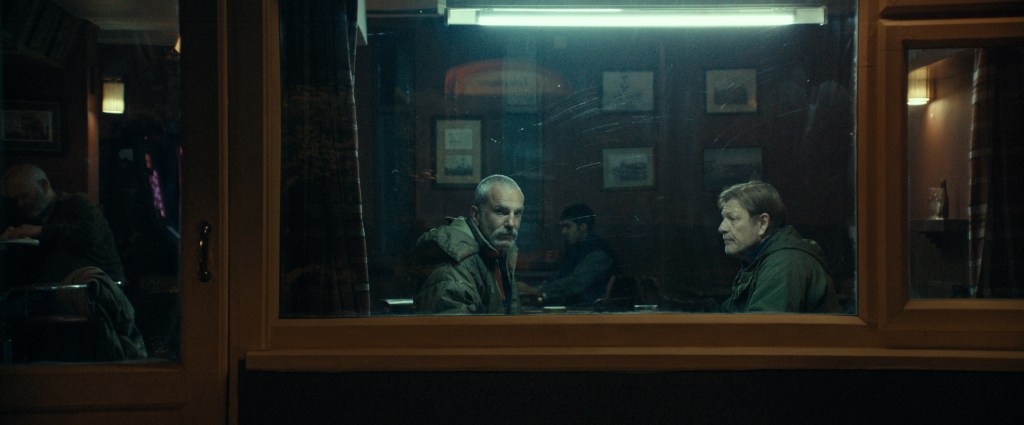“I abandoned my child!” yelled three-time Oscar winner Daniel Day-Lewis in Paul Thomas Anderson’s epic 2008 drama There Will Be Blood, playing a charismatic but nonetheless sociopathic pursuant of the American dream in the California oil boom of the late 19th-slash-early 20th century. And now, in Anemone, here he is again, doing that exact same thing, but this time in the suburban north of 1980s/1990s England, in a much smaller film, albeit one that mines similar seams of fatherhood and toxic masculinity. And that’s not all; PTA casts an even longer shadow now — writing about Anemone, it’s hard not to think of his 1999 opus Magnolia and its recurrent mantra (“We may be through with the past, but the past ain’t through with us”) when squaring up to Ronan Day-Lewis’s assured feature debut, especially in the spectacular, and not to be spoiled, final act.
Having said that, Anemone, is a film that doesn’t live in or anything’s or anyone’s shadow, even though that’s what the story is essentially about, a plot point made all the more salient by the casting — or perhaps that should be positioning — of acting giant Day-Lewis Sr. in his first starring role since Phantom Thread (yep, another PTA production). Press-wise, the fervor for this long-anticipated return has already done a lot of heavy lifting, especially for savvy arthouse audiences. But, although he could so easily have rested on his old man’s laurels, Day-Lewis Jr. instead exploits those expectations of his father’s power (more of that later), and he does so in a fuss-free way that serves the story surprisingly well, right up until the actor finally coughs up his elusive character’s shocking backstory.
It all begins with an odd opening sequence, a left-to-right tracking shot showing either a child’s or an outsider artist’s stick-figure mural depicting 20th-century Irish history and that country’s violent fight for independence from British rule. It’s not very subtle, but neither is it clear who drew it, which is all part of the film’s gnomic commitment to intrigue. We then meet Jem (Sean Bean), a heavily tattooed and by implication much-storied Northern Englishman, a former soldier whose devotion to the cross — “I will not go weak,” he prays, in a broad Yorkshire accent that may, in some territories, need subtitles, “I will not go lazy” — suggests some serious regrets and some hardcore f*ck-ups in his life. What those regrets are, we won’t find out, not in the ensuing two hours and even though, at its core, Anemone is a film about the necessity of airing one’s dirty laundry. (Spoiler alert: dirty laundry does get an airing, including God’s underwear.)
After a brief talk with his stepson Brian (Samuel Bottomley), a taciturn young man with bloodied knuckles, Jem takes off on his motorbike, into a remote but, compared to his dull suburban home, lush and verdant wilderness. This is where he meets his brother Ray (Day-Lewis Sr), who is living a hermit’s life in a rundown cabin, seemingly traceable only by means of longitude and latitude and recognizable, once there, because of a garden full of the flowers that give the film its title. Jem’s instructions clearly state that the directions to Ray’s home are only to be used in an emergency — so why is he going there?
This is the mystery that fuels Anemone, and to be honest, like Ray’s overgrown garden, it could do with some pruning. But Day-Lewis Jr. has grand designs, and what could so easily have passed as rehash of any old British indie from the last 20 years (the story is not its freshest element) has an edgy atmosphere that makes us want to know who Ray really is, and figure out his connection to Jem’s wife Nessa (Samantha Morton) and her son. Throw in some revelatory work from cinematographer Ben Fordesman, who’s totally on a roll right now after Love Lies Bleeding and The Thing With Feathers, and you have a haunting visual experience that very often outclasses what’s actually being spoken.
The star, of course, is the magnificent Day-Lewis Sr., and one can only salute Sean Bean for entering the lion’s den to play both with and against him. Bean might seem like an odd choice at first, being seen — at least nowadays — as a character actor who’s mostly famous for being killed horribly in nearly a third of all the films he’s appeared in (which is probably more than the picky Day-Lewis has ever made in total). But there’s definitely a sense of brotherhood here, and perhaps because the two actors came up through the same industry in more or less the same era but went in very different directions, it’s a chemistry that works.
So, we’ve established that it might be a tad too long. There’s also some seemingly out-of-nowhere magic realism in the last stretch that will definitely bounce out a small percentage of the audience that has been sold on the film’s thus-far grounded realism. One could argue, too, that Anemone is more conventional than those last-minute flourishes suggest, and, indeed, there are several times it could successfully, and poetically, end long before it does. As an experience, however, it does get under the skin, thanks to some effective sound design that sometimes muffles the eclectic needle drops (Black Sabbath, Neil Young, The Jesus and Mary Chain) while simultaneously presenting a conflation of the confessional cinema of Terence Davies and the prickly early novels of Ian McEwan. The script might not always rise to meet that, but everything else does. And it’s a pretty high bar.
Title: Anemone
Festival: New York (Spotlight)
Director: Ronan Day-Lewis
Screenwriter: Ronan Day-Lewis, Daniel Day-Lewis
Cast: Daniel Day-Lewis, Sean Bean, Samantha Morton, Samuel Bottomley, Safia Oakley-Green
Distributor: Focus Features
Running time: 2 hrs 5 mins

